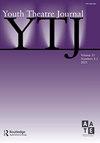From Antigone to Antonia: Moving beyond the teleological model of tragedy for young audiences
Q1 Arts and Humanities
引用次数: 1
Abstract
ABSTRACT Alongside the rich tradition of international tragic adaptation for adult and general audiences, adaptations of tragedy for youth have proliferated around the world in the last several decades. As reaction to these works and to other representations of bad acts for and by young people demonstrate, these plays, which often feature murder, suicide, betrayal, martyrdom, and moral decay, present a substantial challenge to the conventions of appropriateness Manon van de Water cites as central to much contemporary TFY production. Yet adaptations of tragedy for youth must also grapple with a teleological ethics that treats tragedy largely as a means to a developmental end rather than an aesthetic experience in and of itself, presenting a substantial challenge for playwrights interested in producing vital and complex tragedy for young audiences. In this article, I survey trends in global tragedy for young audiences in order to outline an alternative vision of tragedy for young audiences which treats young audiences not as raw material to be molded into the practice of a particular model of goodness but as an end in themselves, outlining an ethics of artistry rather than an ethics of artistic effects.从安提戈涅到安东尼娅:超越年轻观众悲剧的目的论模式
摘要在过去的几十年里,除了为成人和普通观众改编国际悲剧的丰富传统外,为青少年改编的悲剧在世界各地激增。正如对这些作品以及对年轻人的其他不良行为的反应所表明的那样,这些戏剧通常以谋杀、自杀、背叛、殉难和道德沦丧为特色,对Manon van de Water所引用的当代TFY制作的核心适当性惯例提出了重大挑战。然而,为年轻人改编悲剧也必须努力解决目的论伦理问题,该伦理主要将悲剧视为一种发展目的的手段,而不是其本身的审美体验,这对有兴趣为年轻观众创作重要而复杂的悲剧的剧作家来说是一个巨大的挑战。在这篇文章中,我调查了年轻观众的全球悲剧趋势,以勾勒出年轻观众对悲剧的另一种看法,即将年轻观众视为一种目的,而不是将其塑造成一种特定的善模式,勾勒出一种艺术伦理,而非艺术效果伦理。
本文章由计算机程序翻译,如有差异,请以英文原文为准。
求助全文
约1分钟内获得全文
求助全文
来源期刊

Youth Theatre Journal
Arts and Humanities-Visual Arts and Performing Arts
CiteScore
0.60
自引率
0.00%
发文量
1
 求助内容:
求助内容: 应助结果提醒方式:
应助结果提醒方式:


